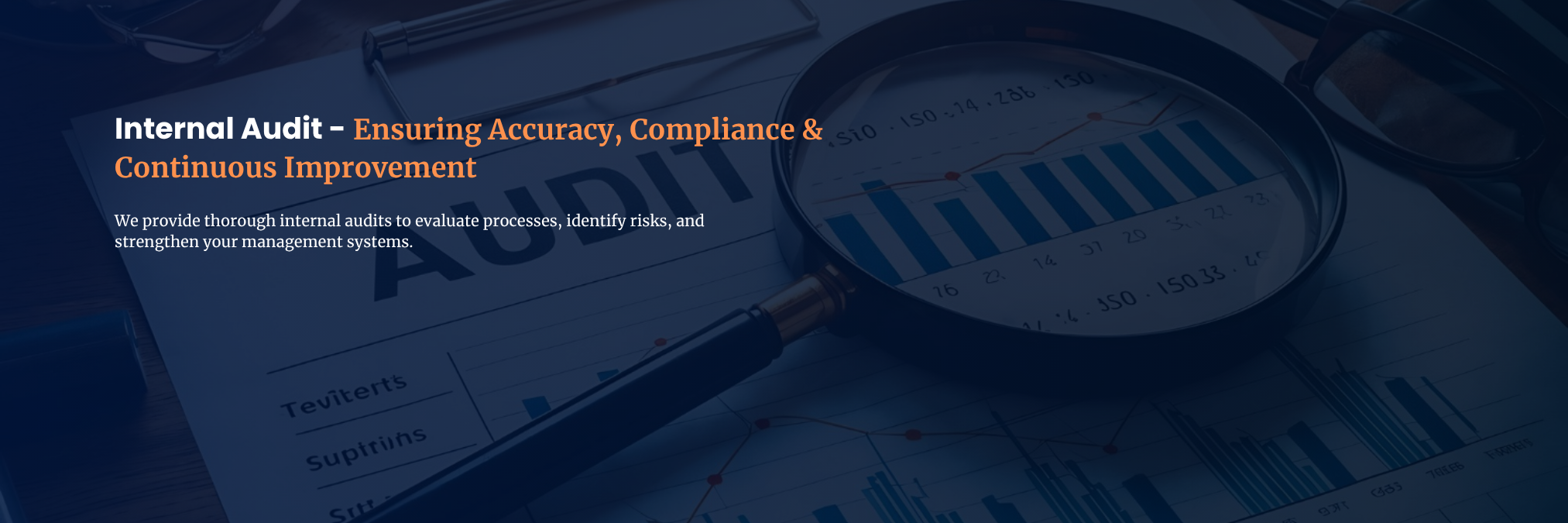

Internal audits are a crucial part of any management system, ensuring compliance with standards such as ISO 9001 (Quality), ISO 14001 (Environment), ISO 45001 (Health & Safety), ISO 27001 (Information Security), and more. These audits help organizations identify gaps, improve processes, and maintain certification readiness.
INTRODUCTION
Internal auditing is an independent, systematic, and objective evaluation of an organization's management system. It assesses compliance with international standards, regulatory requirements, and internal policies. Regular audits help businesses enhance efficiency, reduce risks, and ensure continued compliance with certification bodies.
IMPORTANCE OF INTERNAL AUDIT SERVICES
TYPES OF INTERNAL AUDITS FOR MANAGEMENT SYSTEMS
1. Quality Management System (ISO 9001): Evaluates process effectiveness, customer satisfaction, and continual improvement strategies.
2. Environmental Management System (ISO 14001): Assesses environmental impact, legal compliance, and sustainability initiatives.
3. Occupational Health & Safety Management System (ISO 45001): Ensures workplace safety, hazard identification, and compliance with safety regulations.
4. Information Security Management System (ISO 27001): Examines data security policies, risk mitigation strategies, and cybersecurity compliance.
5. Energy Management System (ISO 50001): Monitors energy efficiency measures, cost reductions, and sustainability compliance.
6. Food Safety Management System (ISO 22000): Verifies food safety protocols, supply chain risks, and hygiene standards.
7. Medical Devices Quality Management System (ISO 13485): Ensures compliance with regulatory requirements for medical device production and distribution.
REQUIREMENTS FOR INTERNAL AUDIT SERVICES
MANDATORY DOCUMENTS REQUIRED (IF ANY)
INTERNAL AUDIT PROCESS
Planning – Define objectives, scope, and audit criteria
Execution – Conduct audit through document review and on-site verification
Reporting – Document findings, identify gaps, and recommend improvements
Corrective Action – Implement corrective and preventive actions
Follow-up Audit – Verify closure of non-conformities and ensure compliance
HOW KMA GLOBAL ASSISTS WITH INTERNAL AUDITS
At KMA GLOBAL, we provide expert internal audit services tailored to your management system requirements:
Ensure seamless compliance with expert internal audits! Contact KMA GLOBAL today.
An internal audit is a systematic, independent, and documented process for obtaining audit evidence and evaluating it objectively to determine the extent to which audit criteria are fulfilled. It serves as a management tool for reviewing the effectiveness of various processes and controls within an organization.
Internal audits help organizations:
Identify areas of non-compliance and opportunities for improvement.
Ensure adherence to internal policies and external regulations.
Enhance operational efficiency and effectiveness.
Prepare for external audits and certifications.
KMA Global offers internal audit services for various Management System Standards (MSS), including:
Quality Management System (QMS) – ISO 9001
Environmental Management System (EMS) – ISO 14001
Occupational Health and Safety Management System (OHSMS) – ISO 45001
Food Safety Management System (FSMS) – ISO 22000
Energy Management System (EnMS) – ISO 50001
Laboratory Quality Management System (LQMS) – ISO/IEC 17025
Service Quality Management System (SQMS) – IS 15700
Mr. Ajay Kumar Bhatnagar, the Chief Technical Advisor at KMA Global, leads the internal audit services. He is a former Scientist F/Senior Director & Head at the Bureau of Indian Standards (BIS) with extensive experience in training, inspection (ISO 17021), auditing (ISO 19011), and the development of Indian Standards. He is also a qualified and experienced Trainer & Lead Auditor for various management systems.
KMA Global provides flexible audit modes to suit organizational needs, including:
On-campus audits
Off-campus audits
Virtual audits
For detailed information on audit fees and scheduling, please contact KMA Global directly at info@kmaglobaltraining.com or call +91-8920982587.
For more information, please visit KMA Global's Internal Audits Overview page.